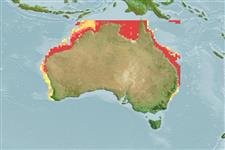Environment: milieu / climate zone / depth range / distribution range
Ecology
Marine; demersal; depth range 11 - 120 m (Ref. 86942). Tropical; 11°S - 35°S, 112°E - 154°E
Indo-West Pacific: known only from Australian waters. Records from the western Indian Ocean are misidentifications of Parapercis robinsoni (Ref. 42740).
Size / Weight / Age
Maturity: Lm ? range ? - ? cm
Max length : 25.0 cm TL male/unsexed; (Ref. 42740)
Body whitish with 6 large quadrangular brown spots on back (may contain small pale blotches and may be red in fish from deep water) and a second series of 6 similar but more round dark spots on lower side of body. Body not very elongate (depth 4.7 to 6.1 in SL). Head with blue lines extending anteriorly from eye and across interorbital. Spinous portion of dorsal fin black between first and fifth spines (Ref 42740).
Found on silty sand and rubble bottoms in shallow bays (Ref. 42740). Feeds on small crustaceans (Ref. 394).
Life cycle and mating behavior
Maturities | Reproduction | Spawnings | Egg(s) | Fecundities | Larvae
Allen, G.R. and R. Swainston, 1988. The marine fishes of north-western Australia: a field guide for anglers and divers. Western Australian Museum, Perth. 201 p. (Ref. 3132)
IUCN Red List Status (Ref. 130435)
Threat to humans
Harmless
Human uses
Fisheries: commercial; aquarium: commercial
Tools
Special reports
Download XML
Internet sources
Estimates based on models
Preferred temperature (Ref.
123201): 23.6 - 28.7, mean 27.1 °C (based on 414 cells).
Phylogenetic diversity index (Ref.
82804): PD
50 = 0.5000 [Uniqueness, from 0.5 = low to 2.0 = high].
Bayesian length-weight: a=0.00692 (0.00311 - 0.01538), b=3.06 (2.88 - 3.24), in cm total length, based on LWR estimates for this Genus-body shape (Ref.
93245).
Trophic level (Ref.
69278): 3.5 ±0.50 se; based on food items.
Resilience (Ref.
120179): Medium, minimum population doubling time 1.4 - 4.4 years (Preliminary K or Fecundity.).
Fishing Vulnerability (Ref.
59153): Low vulnerability (15 of 100).
Nutrients (Ref.
124155): Calcium = 196 [121, 337] mg/100g; Iron = 1.14 [0.72, 1.81] mg/100g; Protein = 17.3 [15.1, 19.1] %; Omega3 = 0.171 [0.096, 0.299] g/100g; Selenium = 61.4 [33.3, 115.1] μg/100g; VitaminA = 23.8 [8.9, 60.5] μg/100g; Zinc = 1.33 [0.98, 1.82] mg/100g (wet weight);
